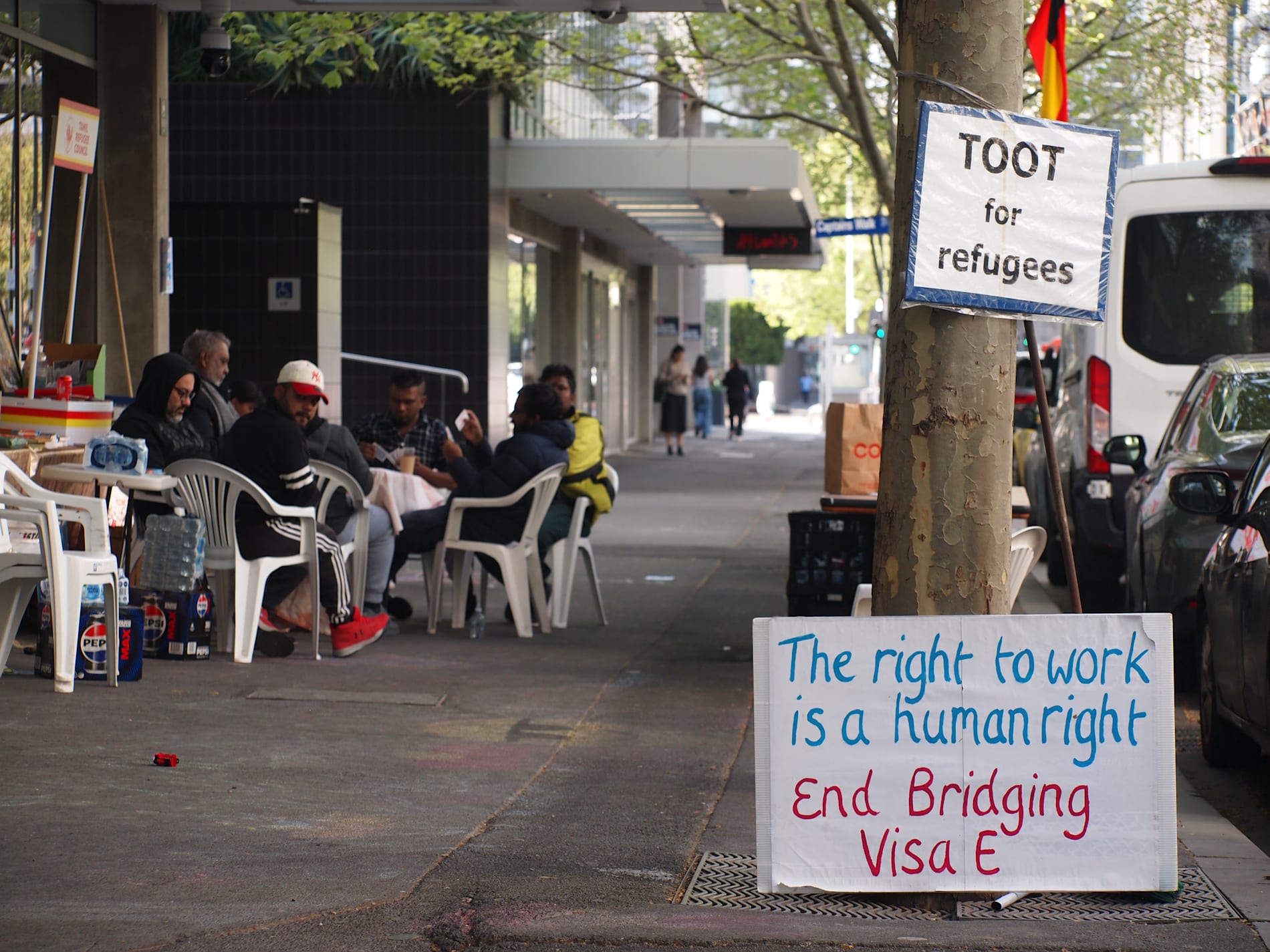
Read the Charter of Independence here.
More than a decade since Scott Morrison introduced the "Fast Track" visa system, up to 8,500 refugees who entered Australia by boat in 2012-13 remain ineligible for permanent visas.
Co-founder of Refugee Women Action for Visa Equality Rathy Barthlote arrived in Australia in 2013, after fleeing the Sri Lankan Civil War.
Like many others in her situation, she lives on a temporary bridging visa with no guarantee of safety or support from the Australian Government.
“We are the Fast Track victims,” Barthlote says.
"That visa has denied our children's studies, work rights, Medicare, etcetera," she says.
"So, that’s why we thought we have to do something for our kids' futures and our life. That’s why we started this campaign."
Bridging visas are intended to temporarily allow people residence in Australia, while waiting to be officially granted protection.
Many are trapped renewing bridging visas for years, unable to access services such as Centrelink payments, Medicare or, in some cases, working rights.
"If you are sitting and eating at home, it's worthless. You will have to wait more than another decade, because already we passed 12 years," Barthlote says.
The camp was established mid-July last year, initially outside Clare O’Neil’s office in Oakleigh, before moving to Bourke Street, Docklands, when Tony Burke replaced her as Minister for Home Affairs.
“We passed the winter weather, and we are going into spring now … In minus-2-degree weather we slept on the footpath,” Barthlote says.
This camp is not the first time Barthlote has persevered through tough circumstances in protest.
In 2023, she was one of 22 Tamil and Iranian refugee women to walk 640 kilometres from Melbourne to Canberra.
“Every day we walked 35 to 45 km … We were sleeping at churches, then the next day we start; it’s like this for 27 days,” Barthlote said.
Barthlote says she’s motivated to act for the refugee children who only know life in Australia but have limited rights in this country.
Despite both her daughters attending school in Australia, without a permanent visa they won’t be eligible for a Commonwealth Supported Place or HECS loan once they reach university.
“Our kids' future is, like, a very big question mark," Barthlote says.
"One of the girls who walked with us, she's now only 22 years old and wants to study medicine, but she pays international student fees. The third year she couldn't pay … and then she dropped out of uni because of the cost."
Upon arriving in Canberra this time last year, Refugee Women Action for Visa Equality received no reply from Parliament.
"We walked, no answer. So, we started this camp," Barthlote says.
The refugees host a weekly march down Bourke Street every Friday evening, receiving mixed responses from the community.
Camp organiser Thanu Mylvaganam says the urban location has exposed the camp to abuse from racist members of public, and law enforcement.
"Three times the racist people came and fight us," Mylvaganam says.
On one occasion, three men allegedly attacked the camp, hitting three women and dislocating one man’s shoulder.
Disputes with police and the local council have only increased the group’s vulnerability.
The City of Melbourne prohibits camping in tents, vehicles or any temporary structures without a permit.
On several occasions, law enforcement has removed the tents and confiscated the belongings of the refugees, so the group camps on the ground with just sleeping bags and the building’s overhang for shelter.
Melbourne MP Adam Bandt criticised the council for requesting police, pledging his support to the encampment and peaceful protests generally, in a recent TikTok.
Mylvaganam says that denying refugees permanent visas is racist, as all white people once migrated to this country.
"This country is not white people country, this country is an Aboriginal country. Everyone came here, works here, but they have to give chances for our community too,” Mylvaganam says.
The group flies Aboriginal flags beside their own banners at the camp and all their rallies.
Although they are yet to receive any official response from the Australian Department of Home Affairs, the refugees concluded the camp after reaching 100 days.
"When we started this campaign, we were thinking we were alone, after a few weeks we have a very good community,” Mylvaganam says.
“Everyone is supporting us, the refugee organisations, the individual person, the residents here around Docklands, everyone is supporting us as much as they can."
Since the first Friday night rally 14 weeks ago, several protest groups including pro-Palestine protesters, Aboriginal rights protesters, the National Tertiary Education Union and the United Workers Union have marched to support the refugees.
An open letter was sent to the Prime Minister and Minister for Home Affairs to mark 100 days.
The letter was signed by 75 organisations including refugee, human rights, legal and religious groups.
“It is absolutely within the government’s power to end this cruelty,” the letter states.
“We call on the government to rise above the politics of fear and division, and act swiftly and fairly, with clear communication and timeframes.”